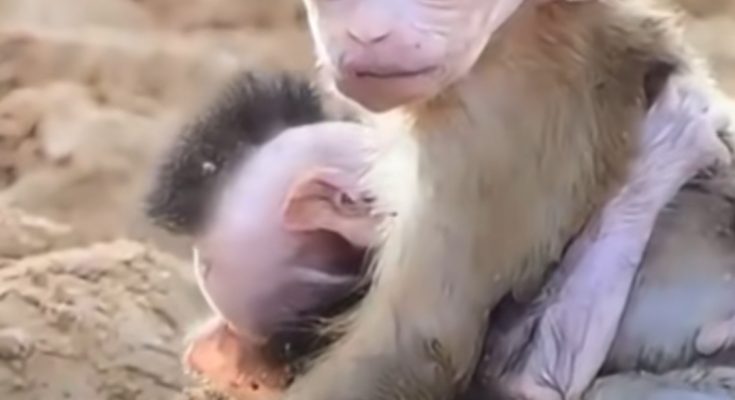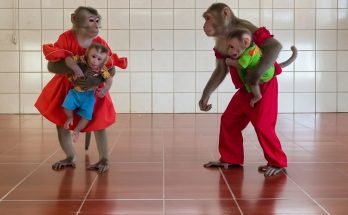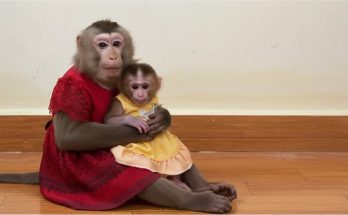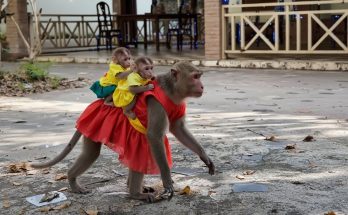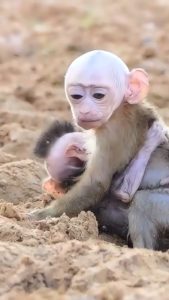
In the deep forest where the sun filters through thick green leaves and the wind hums softly through tall trees, two little monkeys sat together on a cold, wet branch. They were alone, trembling, their small bodies pressed close to each other for warmth. Their fur was dirty, their eyes full of sadness and confusion. They were orphans — two helpless souls left behind in a dangerous world.
The older one was named Tino, not more than a year old. The smaller one, Lila, was his baby sister, still too young to understand what had happened. Only a few days ago, their mother had been with them — her arms warm, her heart steady, her voice gentle. But now, she was gone forever.
It had all happened so fast. One morning, while the family searched for fruit near the river, a pack of stray dogs came running through the forest, barking wildly. The monkeys screamed and scattered. Their mother, holding Lila, tried to leap across the branches, but the branch snapped under her weight. She fell hard to the ground. Tino had climbed high up a tree and watched helplessly as one of the dogs attacked.
The mother fought bravely, protecting her baby until the last breath. When the dogs finally ran away, Tino came down, crying loudly. His mother lay still in the dirt, her eyes half open but empty. Lila, crying softly in her mother’s arms, didn’t understand. She tried to suckle, but there was no warmth left.
Tino hugged her tightly, shaking. He cried until the sun disappeared, until the night was filled with the sounds of insects and faraway owls. The two babies stayed beside their mother’s body all night, too scared to move. The next morning, she was cold.
That was the day they became orphans.
Now, days later, they wandered aimlessly through the forest, hungry and afraid. The rain had fallen the night before, and the ground was slippery with mud. Lila clung to Tino’s back, her small hands shaking. Her eyes were red from crying.
Tino tried to be strong, though his heart felt broken. He remembered how his mother used to find fruit — how she’d climb tall trees and call to him gently. Now, he tried to do the same. He found a small bush with red berries and plucked a few, giving them to Lila first. She chewed weakly, her little mouth trembling.
“It’s okay,” Tino whispered softly. “Eat, little one. I’ll take care of you.”
But he was just a baby himself — too small, too weak. He didn’t know where to go or how to survive without their mother. Still, he carried her voice in his heart, whispering: “Be brave, my son. Protect your sister.”
As the sun rose higher, they climbed through the trees in search of food. The forest was alive with noise — birds calling, insects buzzing — but to them, it felt lonely. Every rustle of leaves made Tino flinch, fearing predators. He remembered his mother’s warnings about snakes, hawks, and other monkeys that might hurt them.
They came across a group of adult monkeys in a large fig tree. For a moment, Tino felt hope. Maybe they would help. He climbed closer, carrying Lila. But as soon as the older monkeys saw them, they began to shout angrily. Orphaned babies were often not welcome; they were strangers, and strangers were seen as threats.
One big male monkey jumped toward Tino, baring his teeth. Tino cried out and scrambled back, clutching Lila tightly. The male chased them for a short distance before returning to his troop. The two little orphans hid behind a tree trunk, shaking with fear.
Lila whimpered softly, tears glistening in her eyes. “Brother… hungry…”
Tino stroked her tiny head and whispered, “I know. I’ll find something. Don’t cry.”
But deep inside, his heart broke. He couldn’t even feed her properly.
By afternoon, the forest grew hot. They found a small puddle and drank from it. Lila’s breathing was weak. Her body felt warm — maybe from hunger, maybe from fever. Tino didn’t know what to do. He held her close, rocking her gently as his mother used to do for him.
“Don’t leave me,” he whispered. “You’re all I have.”
Lila rested her head against his shoulder. Her tiny eyes blinked slowly. “I want Mama,” she murmured.
Tino bit his lip, tears spilling silently. “Mama’s watching us,” he said softly. “She’s up in the trees above. You just can’t see her.”
Lila gave a weak smile before closing her eyes.
That night, they found shelter under a fallen log. Rain began to fall again — cold and heavy. The wind howled through the trees. Tino wrapped his arms around Lila, trying to keep her dry. The water dripped from the leaves, soaking them both. He could feel her trembling in his arms, her breath shallow and quick.
“Sleep, Lila,” he whispered. “When the sun comes back, I’ll find food for you.”
She made a small sound — a whimper, then silence.
Tino stayed awake all night, shivering. His stomach hurt with hunger. His eyes were heavy with tears. He kept listening to her breathing, afraid it would stop. He whispered her name over and over again, as if the sound could keep her alive.
When dawn finally came, the forest looked peaceful again — birds singing, sunlight breaking through the mist. But Tino felt no peace. Lila’s small body lay still beside him, her eyes closed forever. Her tiny hands, once clinging to his fur, now hung loose.
He shook her gently. “Lila? Wake up. The rain stopped. We can find food now.”
No answer.
“Please, Lila.” His voice cracked. He lifted her tiny body in his arms, pressing her close, trying to feel warmth — but there was none. “Please wake up,” he cried. “Don’t leave me. I promised Mama.”
But the forest stayed silent. Only the sound of dripping water answered him.
Tino broke down, crying so hard his small body shook. He rocked her in his arms like his mother once rocked him. “I’m sorry, Lila. I couldn’t protect you. I tried.”
For hours he sat beside her, refusing to move. The sun rose high, then began to fall again. Finally, he carried her to a quiet spot under a big fig tree. He laid her down gently on a bed of leaves. He touched her face one last time, then sat there silently, staring at her.
“Sleep now,” he whispered. “Mama will hold you again. You won’t be hungry anymore.”
Then he climbed the tree above her and sat alone, staring down. His small chest heaved with sobs. He didn’t want to eat, didn’t want to move. The world felt empty without her tiny hands and her little voice calling his name.
Days passed. Tino wandered alone through the forest, weak and broken. He no longer cried; his eyes were dry and tired. He searched for food but rarely ate. Sometimes he saw other monkeys from far away — mothers grooming their babies, feeding them, playing together. He would stop and watch quietly from the shadows, his heart aching with jealousy and grief.
One afternoon, he saw a baby monkey almost Lila’s size, clinging to its mother’s belly. The mother kissed her baby’s head gently, feeding it soft fruit. Tino couldn’t help it — tears filled his eyes again. He turned away quickly, his little shoulders trembling.
The forest was still alive, but for him, everything had changed. Every branch, every leaf, reminded him of what he had lost.
Then, one morning, as Tino sat quietly by the river, a kind old female monkey from another troop noticed him. She was gathering fruit when she saw his thin, lonely figure sitting by the water, staring blankly at his reflection.
She approached slowly, not wanting to scare him. “Little one,” she called softly.
Tino looked up, startled. His eyes were dull, his fur dirty. He didn’t answer.
The old female saw the sadness in his face and the emptiness in his arms. She understood immediately — he had lost everything. Her heart softened. She reached out a piece of fruit. “Eat, little one,” she said gently.
He hesitated but took it. The sweet taste filled his mouth — the first real food he’d eaten in days.
“You can stay near us,” she said kindly. “No one will hurt you.”
For a moment, he just stared at her. Then, slowly, he nodded.
The old female had a baby of her own, a playful little one who was curious about Tino. At first, he stayed distant, afraid to get close, but the baby kept trying to play with him. Bit by bit, Tino began to respond — just small gestures, quiet smiles. He followed them from tree to tree, learning to eat and move with the troop.
Still, when night came and the forest turned dark, Tino often looked up at the sky. He would whisper softly, “Mama, Lila… can you see me? I’m trying to be strong, like you told me.”
Sometimes, when the wind blew gently through the leaves, it felt like a soft touch — like his mother’s hand brushing his fur.
Though he began to live again, a part of him always stayed broken. Every time he saw a baby sleeping in its mother’s arms, his heart would ache. But he never turned away. He often brought food to the smaller ones, sharing quietly, remembering how it felt to be hungry and alone.
The old female saw this and smiled. She knew he carried deep pain, but she also saw kindness — a kind that comes only from loss.
So if one day you walk through the forest and see a small monkey sitting alone on a branch, staring quietly at the sky, don’t just pass by. Look closer. Maybe he is Tino — the little orphan who lost everything but still found the courage to live.
And when you see him, let your heart feel pity. Not because he is weak, but because he has known more sorrow than most creatures ever will — yet still survives.
Two orphaned monkeys — one gone, one left behind. A story of love, loss, and heartbreak in the silent green world.
You should feel very pity for them — for the pain they carried, for the loneliness they endured, and for the love they never got to keep.
